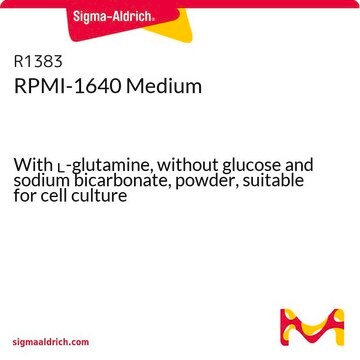R7755
RPMI-1640 Medium
AutoMod™, without L-glutamine and sodium bicarbonate, powder, suitable for cell culture
Pharma Manufacturing
Synonym(s):
Roswell Park Memorial Institute 1640 medium
About This Item
Recommended Products
Quality Level
form
powder
technique(s)
cell culture | mammalian: suitable
components
sodium pyruvate: no
HEPES: no
NaHCO3: no
L-glutamine: no
phenol red: yes
shipped in
ambient
storage temp.
2-8°C
Looking for similar products? Visit Product Comparison Guide
General description
Other Notes
Without L-glutamine and sodium bicarbonate.
Quantity
Reconstitution
Legal Information
also commonly purchased with this product
supplement
Storage Class Code
11 - Combustible Solids
WGK
WGK 2
Flash Point(F)
Not applicable
Flash Point(C)
Not applicable
Certificates of Analysis (COA)
Search for Certificates of Analysis (COA) by entering the products Lot/Batch Number. Lot and Batch Numbers can be found on a product’s label following the words ‘Lot’ or ‘Batch’.
Already Own This Product?
Find documentation for the products that you have recently purchased in the Document Library.
Customers Also Viewed
Our team of scientists has experience in all areas of research including Life Science, Material Science, Chemical Synthesis, Chromatography, Analytical and many others.
Contact Technical Service



